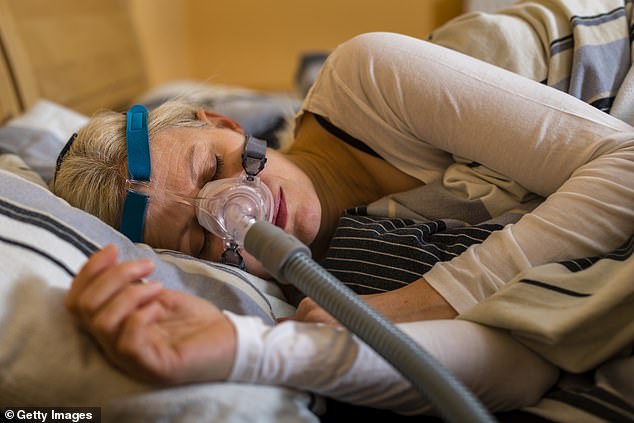‘King Kong’ weight loss jab offers hope to patients with serious snoring disease affecting up to 10 million Brits, study shows
A drug dubbed ‘the King Kong’ of weight loss shots could also tackle a serious snoring disease that causes patients to stop breathing in their sleep, a new study reveals.
Researchers have found that tirzepatide, sold under the brand name Mounjaro, can improve symptoms of obstructive sleep apnea, which affects up to 10 million Britons.
Currently, the only treatment is a lifestyle modification or a CPAP machine that helps keep the airways open at night.
But tirzepatide represents an “important milestone” in controlling the condition, experts say.
Experts have found that tirzepatide, sold under the brand name Mounjaro, can improve symptoms of obstructive sleep apnea, which affects up to 10 million Britons
The drug has already proven dramatically effective in controlling type 2 diabetes and weight loss.
Research found that a third of type 2 diabetics taking tirzepatide lost more than 20 percent of their body weight after just over a year and saw their blood sugar levels brought under control.
The average obese person who weighed 105 kg lost 23 kg in 17 months.
This makes the treatment twice as effective as semaglutide injections, better known as Ozempic and Wegovy.
When the first results of studies on tirzepatide were announced at a medical conference in 2018, Dallas-based diabetes expert Dr. Julio Rosenstock said he had nicknamed semaglutide, sold under the brand name Ozempic, “the gorilla” because it is the most powerful drug was in the world. his kind until then.
“But tirzepatide really is King Kong,” he added.
For the new study, researchers recruited 469 participants diagnosed with obesity and moderate to severe sleep apnea.
They were given 10 mg or 15 mg of the drug via injection or a placebo once a week and were followed for about a year.
Analysis found that Mounjaro led to a significant reduction in the number of breathing interruptions during sleep – a key indicator used to measure the severity of sleep apnea.
Participants taking the drug experienced up to 30 fewer events per hour – a reduction of almost two-thirds – compared to the placebo.

Star Wars actress Carrie Fisher’s death in 2016 was partially attributed to severe sleep apnea and heart disease, according to her autopsy report.

Although effective, CPAP machines – typically a face mask attached via a tube to an oxygen tank that delivers oxygen at a continuous pressure to ensure breathing – are uncomfortable.
Some participants taking the drug even reached a point where CPAP therapy may no longer be necessary.
Obstructive sleep apnea is a serious condition, usually linked to obesity, in which the tissues at the back of the throat ‘collapse’ during sleep, blocking the airways.
In addition to sleep interruptions, patients are known to be at increased risk of heart problems due to the stress breathing interruptions placed on the body.
Star Wars actress Carrie Fisher’s death in 2016 was partially attributed to severe sleep apnea and heart disease, according to her autopsy report.
Although effective, CPAP machines – typically a face mask attached via a tube to an oxygen tank that delivers oxygen at a continuous pressure to ensure breathing – are uncomfortable.
Tirzepatide also led to improved body weight and a lower risk of cardiovascular disease.
Lead author Atul Malhotra said: ‘This study marks an important milestone in the treatment of obstructive sleep apnea and offers a promising new therapeutic option that addresses both respiratory and metabolic complications.
‘Historically, treating sleep apnea has involved using devices during sleep, such as a CPAP machine, to relieve breathing difficulties and symptoms.
‘However, its effectiveness depends on consistent use. This new drug treatment provides a more accessible alternative for individuals who cannot tolerate or adhere to existing therapies.”
The drug is manufactured by pharmaceutical company Eli Lilly.
Dr. Kunal Gulati, Lilly’s executive director of diabetes and obesity medical affairs, said: ‘Obstructive sleep apnea is a sleep-related breathing disorder associated with episodes of complete or partial collapse of the upper airway during sleep, interrupting the body’s oxygen supply.
‘It is estimated that up to 3 million people in the UK have obstructive sleep apnea but have not yet been diagnosed.
‘Tirzepatide has the potential to be the first pharmaceutical treatment… that could address the unmet need of people living with this condition.’
The findings were published in the New England Journal of Medicine.
